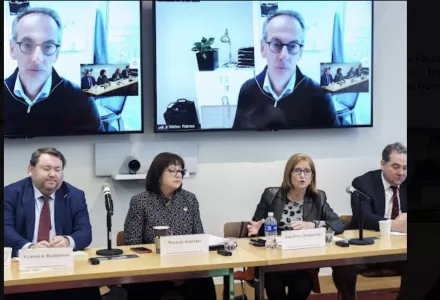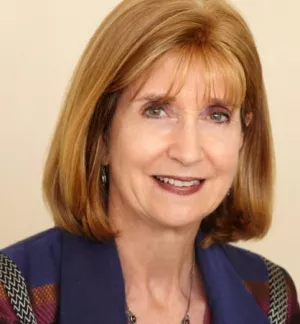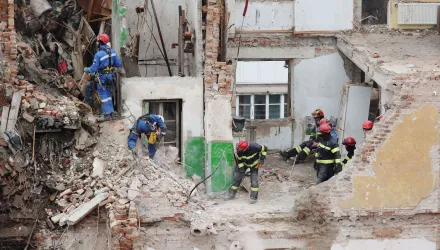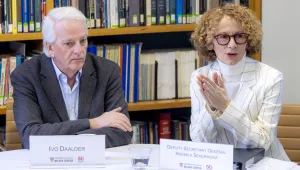
The following is an event write-up about the recent Future of Diplomacy Project (FDP) seminar on “The Future of Ukraine: Reconstruction, Energy Security, and Innovation” moderated by Ambassador Paula J. Dobriansky, Senior Fellow with the Future of Diplomacy Project.
This seminar was the second part of a two-part series on the reconstruction of Ukraine. It continued the conversation from March 29, which saw a panel discussion consisting of former U.S. Treasury Secretary Lawrence H. Summers, White Burkett Miller Professor of History at the University of Virginia Dr. Philip Zelikow, and former Assistant U.S. Secretary of State Stephen Rademaker. They primarily delved into the legal ramifications around procuring Russian assets to fund Ukraine’s reconstruction rather than relying on American and European taxpayers to provide the necessary economic support for Ukraine.
Following a report jointly released by the Government of Ukraine, the World Bank, the European Commission, and the United Nations which estimates the cost of reconstruction in Ukraine to be $411 billion (nearly 2.6 times Ukraine’s estimated GDP in 2022), the second seminar discussion centered primarily on the role of the private sector, the opportunity for technological leapfrogging, and the prevailing challenges of refugees and governance in rebuilding Ukraine.
Matteo Patrone, the Managing Director of Eastern Europe and Caucasus at the European Bank for Reconstruction and Development (EBRD), voiced his concern for the need for a good business environment, where energy resilience and the vital services infrastructure remain crucial. Alternative Executive Director at the International Monetary Fund, Vladyslav Rashkovan, reiterated Patrone’s point by saying, “I don’t believe the country can be rebuilt with public money.”
On Ukraine’s role on the world stage, Director of the Project on Prosperity and Development at the Center for Strategic and International Studies (CSIS), Daniel Runde, urged that “Ukraine ultimately needs to become a member of NATO” further remarking that “...we need to have Ukraine fully involved in the European Union.” However, even though Runde mentioned that Ukraine should prioritize the seven buckets of requirements to join the EU (five of which concern governance), he noted that the biggest challenge Ukraine faces is corruption, especially within its vulnerable judicial system.
Similarly, the former Finance Minister of Ukraine, Natalie Jaresko, commented that “judicial reform…is the absolute number one issue” continuing to espouse transparency in governance at every level so that taxpayers and stakeholders can benefit from confidence in a system of compliance and accountability by the government.
Further distancing themselves away from the idea of a large government presence, both Rashkovan and Jaresko emphasized the importance of civil society with Jaresko heralding it as “the bedrock of how Ukraine has become this democratic and incredibly strong, fiercely-resistant country.” They continued this discussion by pivoting towards the role of human capital and the unique opportunity for technological progress that this crisis provides. Additionally, Rashkovan highlighted the importance of education as a differentiating factor in bringing people home, and further underlined how refugees present the biggest issue for Ukraine.
Emphasizing the need to attract the private sector, Jaresko urged massive foreign direct investment that capitalizes on emerging technologies such as sustainable and green infrastructure, as well as the digitization of government that removes Soviet-era frameworks. Simply put, “We need jobs, housing, and schools” as Runde said.
The overall theme of the discussion had an underlying sense of urgency. Jaresko called upon people to “use the crisis” since political support for reform tapers when the crisis is over. “You cannot wait until the world is over,” she continued, “recovery has got to begin now, and job creation has got to begin now.” However, Runde cautioned that Ukraine must have a successful spring offensive to continue U.S. support with the logic that, “if they’re winning on the battlefield, nobody is going to stop supporting the cause.”
Patrone opined that it would be wrong and incredibly dangerous to wait until the conflict is over before taking action, saying that, “what is actually needed now is a stronger and closer and more effective coordination among all of us that care about the future of Ukraine.” Ending on a rather encouraging note, Jaresko called upon everyone to consider how they can participate in Ukraine’s reconstruction – whether through judicial reform, the revitalization of civil society, innovation in technology, or assistance with refugees – as “this is going to be the most exciting opportunity in our living history.”
Watch the full event here.
Kossmann, Gregor. “EVENT DEBRIEF: The Future of Ukraine: Reconstruction, Energy Security, and Innovation.” Belfer Center for Science and International Affairs, Harvard Kennedy School, April 18, 2023







